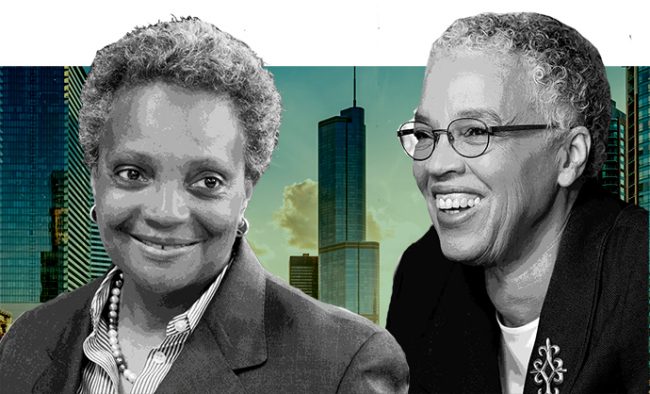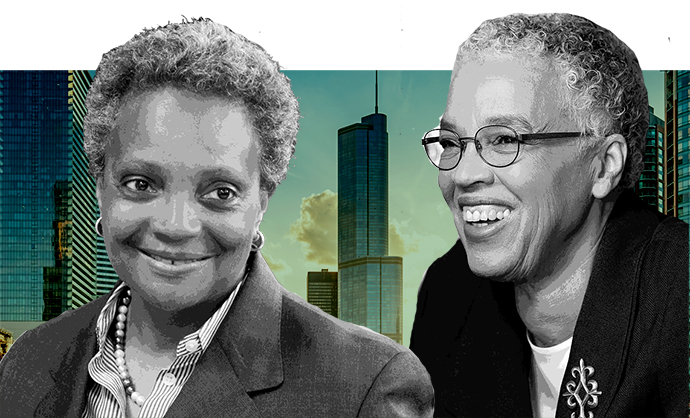
Lori Lightfoot and Toni Preckwinkle
The race to replace Mayor Rahm Emanuel is down to Lori Lightfoot and Toni Preckwinkle.
With more than 96 percent percent of the vote counted, Lightfoot led the mayor’s race with 17.5 percent. Preckwinkle came in second with 16 percent of the vote, edging out third-place finisher Bill Daley, largely seen as the real estate industry’s favored candidate.
Fourteen candidates sought to replace Emanuel, whose two terms in office were generally seen as boom times for downtown developers. With such a large and diverse group of candidates, the race worried some in the real estate world that a new administration would bring a shift in development policies.
Those worries may be founded. In her victory speech, Lightfoot, a former federal prosecutor and former head of the city’s police board, referred to herself as a “new reformer … in a pack of establishment figures.”
Lightfoot has advocated for a graduated real estate transfer tax and supports Cook County Assessor Fritz Kaegi’s mission to reform property assessments — a move that could hurt some major developers and landlords. She vowed to fight for a “vision for a future that includes all of us, in every neighborhood.”
“This, my friends, is what change looks like,” Lightfoot said.
Lightfoot will face Preckwinkle in the April 2 runoff. Preckwinkle, the Cook County Board president, garnered support from union groups but virturally none from the real estate community, which accounted for just 3 percent of the contributions to her $3.5 million-plus campaign fund.
The business community’s favored candidate, Daley, finished third in the race. Even with thousands of mail-in ballots still uncounted, Daley conceded shortly before 10 p.m. Tuesday.
The real estate industry made its preferences in the mayoral race well known, giving hundreds of thousands of dollars in campaign contributions two a few of the candidates viewed as most friendly to developers, brokers and building trades.
Still, not every big name developer and landlord picked a candidate. With no clear favorite emerging, some segments of the industry were waiting for the outcome of the election to see which candidates might face off in an April 2 runoff.
No matter the outcome, the real estate world is bracing for change as Emanuel’s generally pro-development administration heads for the door. One thing is for sure: Chicago will have its first black female mayor.
Both Preckwinkle and Lightfoot back a number of progressive policies affecting the real estate industry.
In January, nine of the 14 candidates attended a Chicago Association of Realtors forum. And while usually cautious to keep a public distance from developers and other big donors, they used the forum to brandish their ties to the real estate industry.
While most of the candidates said they opposed rent control, Preckwinkle said she supported a growing effort to lift the state’s ban on it. Preckwinkle, who worked to label herself as one of the most progressive candidates in the race, has endorsed policies like boost the city’s real estate transfer tax and was instrumental in passing the city’s affordability requirement ordinance when she was an alderman in 2003.
Lightfoot, whose polling surged at the end of the campaign to put her roughly even with Daley and Preckwinkle, proposed a graduated real estate transfer tax, though she dodged the question of rent control at the Realtors forum.
She has said she supports limiting aldermanic privilege, supports expanding the Affordable Requirements Ordinance and wants to replace the “regressive” real estate transfer tax with a more progressive system, according to her website.
Preckwinkle supports increasing the real estate transfer tax on properties over $1 million.
Considered the favored candidate of Chicago’s business community, Daley’s race-leading $8 million-plus in campaign contributions included at least $577,000 from developers and investors. Contributors included Michigan Avenue Real Estate Group owner Thomas Meador ($200,000) and Equity Commonwealth chairman Sam Zell ($125,000), according to a The Real Deal review of campaign finance disclosures.
Daley, a former investment banker, U.S. Commerce Secretary under President Bill Clinton and chief of staff to President Barack Obama, also received at least $2 million from billionaire Ken Griffin.
Illinois Comptroller Susana Mendoza received more than $817,000 from real estate professionals, with the vast majority of that amount — $745,000 — coming from building trades unions. But that wasn’t enough to push her into double digits in the vote totals.
Real estate attorney Gerry Chico netted $221,000 from building trades groups, part of the $376,000 the one-time chief of staff to former Mayor Richard M. Daley got in real estate-related donations. He had just about 6 percent of the vote.
Rounding out the field of candidates were former Chicago Public Schools chief Paul Vallas, attorney Jerry Joyce, businessman Willie Wilson, former Chicago Police Supt. Garry McCarthy, Austin Chamber of Commerce Director Amara Enyia, State Rep. LaShawn Ford, entrepreneur Neal Sales-Griffin, former Alderman Bob Fioretti and lawyer John Kozlar.
